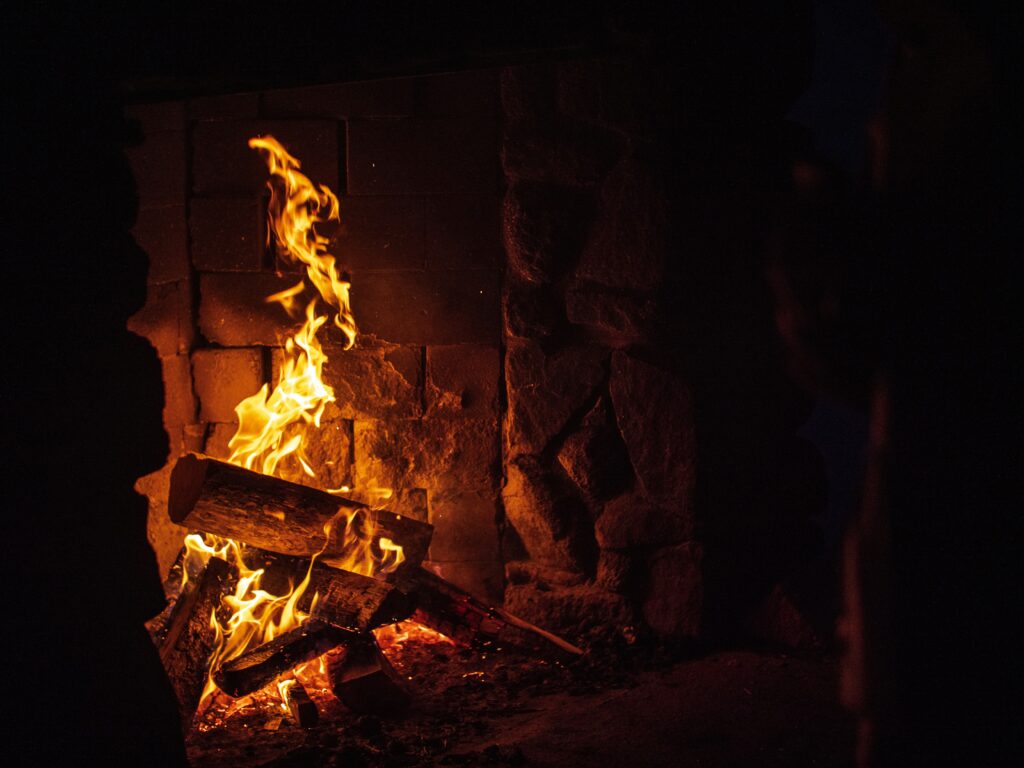In Chicago’s historic buildings and modern high-rises, fireplaces serve as both primary heat sources and cherished architectural features. However, they require special attention to prevent fires, especially during our intense heating season. At Chicago Water & Fire, we’ve helped countless property owners recover from fireplace-related emergencies, and we’re sharing our expertise to help prevent these incidents.

Understanding Fireplace Risks in Chicago Properties
Urban Building Challenges
- Historic masonry chimneys in vintage buildings
- Multiple flues serving different units
- Shared walls between properties
- High-rise ventilation considerations
Chicago’s Unique Concerns
- Extended winter heating demands
- Freeze-thaw damage to masonry
- Stack effect in tall buildings
- Mixed-use heating systems
8 Essential Fireplace Safety Tips to Prevent Fireplace Fires
1. Schedule Regular Inspections and Maintenance
A well-maintained fireplace is less likely to cause a fire.
- Annual inspections required by Chicago Fire Code
- Professional cleaning before heating season
- Specific checks for:
- Historic masonry deterioration
- Liner integrity in vintage chimneys
- Shared flue conditions
- Draft performance in high-rises
2. Use Appropriate Fuel for Your System
The type of fuel you use plays a significant role in fireplace safety.
- Follow regulations for wood-burning fireplaces
- Verify fuel requirements for converted gas units
- Consider Chicago’s clean air ordinances
- Never burn:
- Treated wood
- Construction debris
- Holiday wrapping
- Painted materials
3. Install Required Safety Features
Adding protective measures can significantly reduce risks.
- City-mandated smoke and CO detectors
- Code-compliant fireplace screens or glass doors
- Proper hearth extensions
- NFPA-approved spark arrestors
- High-rise specific safety features
4. Follow Safe Operating Practices
Small habits can make a big difference in preventing fires.
- Monitor during high wind conditions
- Manage fires during extreme cold
- Never overload historic fireplaces
- Cool ashes completely before disposal
- Use metal containers for ash disposal
5. Maintain Proper Clearance
A clutter-free space around your fireplace minimizes the risk of accidental fires.
- Follow Chicago Fire Code spacing requirements
- Keep 3-foot minimum from:
- Radiators and heating pipes
- Window treatments
- Vintage woodwork
- Holiday decorations
- Use a fire-resistant hearth rug to protect your flooring from stray sparks.
6. Ensure Proper Ventilation
Good airflow prevents smoke and harmful gases from accumulating indoors.
- Open the damper fully before lighting a fire and keep it open until the fire is completely out
- Be aware of the building stack effect, which can cause a downdraft of smoke
- Check for obstructions like nests or ice blockages in winter
- Verify proper draft before each use
7. Educate Building Residents
Everyone in your household should know how to use the fireplace safely. Teach children the dangers of fire and establish a no-play zone near the fireplace. Adults should know how to properly ignite, maintain, and extinguish a fire.
If you’re in a larger building, the community should be aware of best safety practices:
- Share fireplace operation guidelines
- Establish clear usage policies
- Post emergency procedures
- Coordinate with building management
- Train on proper operation techniques
8. Prepare for Emergency Response
- Install fire extinguishers per code
- Post evacuation routes
- Maintain clear stairwell access
- Keep our emergency number accessible — 800-597-6911
Fireplaces can be a safe and enjoyable feature in your home with the proper precautions. By maintaining your fireplace, using it responsibly, and equipping your home with safety tools, you can enjoy the warmth and ambiance worry-free.
Professional Fire Damage Services
Chicago Water & Fire offers comprehensive services include:
- 24/7 emergency response
- Professional fire damage restoration
- Smoke and soot removal
- Historic material preservation
- Insurance documentation
- Code compliance verification
Expert Help When You Need It
Our team understands Chicago’s unique building stock and strict fire codes. For emergency fire damage restoration, call us 24/7 at 800-597-6911. We provide:
- Rapid response throughout Chicagoland
- Experience with historic properties
- Knowledge of local building codes
- Coordination with insurance providers
- Professional documentation
Remember, while fireplaces are essential for Chicago’s long winters, proper maintenance and careful operation are crucial for safe enjoyment. Don’t wait until there’s a problem – for professional assessment or emergency restoration, contact Chicago Water & Fire.
